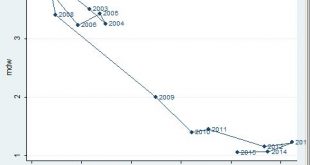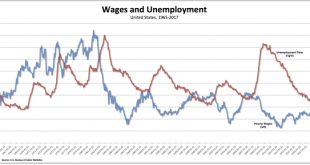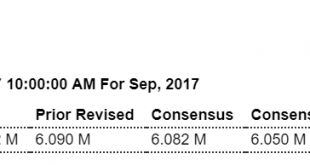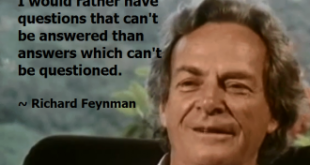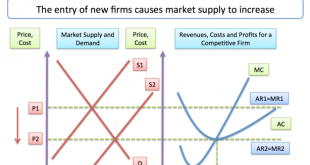The Guardian newspaper has a story about wages in England: A shortage of factory workers is starting to push up pay rates but wage rises in the services sector remain rooted at around 2%, according to the latest feedback from the Bank of England’s regional agents. The central bank said its agents, which are based in offices across the country, found that shortages this month across the manufacturing sector were leading to a “slight increase in pay growth”...
Read More »Productivity growth is up, are the robots finally coming?
from Dean Baker The Bureau of Labor Statistics (BLS) reported that productivity grew at a 3.0 percent annual rate in the third quarter of 2017. While this report got little attention, it is potentially very good news. Before going into the good news part, it is worth briefly saying a bit about what productivity is. Productivity measures the value of the goods and services produced in an hour of work. It is the main determinant of living standards. If we want more or better housing or...
Read More »A Bit More on Inflation Expectations
I honestly surfed here just to see if anyone was still interested in inflation expectations now that The Fed has shifted from extraordinary efforts to stimulate to normal efforts to take away the punch bowl before workers get uppity. I was pleased to find the post by Bonddad immediately below However, I don’t agree entirely with Hale Stewart and agree less with Stephan Poloz. The first point is that expected US inflation has been very stable and very...
Read More »Waiting for Godot
from David Ruccio The official unemployment rate continues to fall in the United States. And everyone, at least among top policymakers and the business press, has been promising that workers’ wages will finally break out. As it turns out, the unemployment rate (the red line in the chart above) in September was 4.1 percent, far below the high of 10 percent in October of 2009 and a new low for the so-called recovery from the Second Great Depression. However, hourly wages (for production and...
Read More »Presentation on the Irish Economy
On Monday of this week I gave a presentation on the current state of the Irish economy at a conference on the future of Europe at the LBJ School of Public Affairs. My presentation begins around the 33 minute mark and is followed by some Q&A. It can be accessed here: Presentation on the Irish economy div{float:left;margin-right:10px;} div.wpmrec2x div.u > div:nth-child(3n){margin-right:0px;} ]]> Advertisements
Read More »JOLTS, Consumer credit, Tax cuts, Market cap chart, 55+ housing index, MMT conference closing remarks
Note that hires and quits have stopped growing, and historically both lead job openings, in yet another indication that this cycle has reversed: Highlights September job openings edged up slightly to a very abundant 6.093 million from a revised 6.090 million in August. Over the month, hires and separations were also little changed at 5.3 million and 5.2 million, respectively. Within separations, the quits rate and the layoffs and discharges rate were little changed at 2.2...
Read More »When economists become as modest as the physicists
from Lars Syll In advanced economics the question would be: ‘What besides mathematics should be in an economics lecture?’ In physics the familiar spirit is Archimedes the experimenter. But in economics, as in mathematics itself, it is theorem-proving Euclid who paces the halls … Economics … has become a mathematical game. The science has been drained out of economics, replaced by a Nintendo game of assumption-making … Most thoughtful economists think that the games on the blackboard and...
Read More »Demonetisation in India: the marketing view
One of the advantages of marketeers, compared with neoclassical economists, is that they do not assume things about consumers but observe them or ask them questions. So did Nielsen India, a large marketing company, less then a month after the infamous Indian demonetisation. The report is ungated and, for one thing, contains valuable information about the female experience. An excerpt PART B: DECODING CONSUMER SENTIMENT (Source: Nielsen India)To pick up the consumer sentiment at this point...
Read More »Open thread Nov. 7, 2017
Global rentier capitalism
from David Ruccio Mainstream economics lies in tatters. Certainly, the crash of 2007-08 and the Second Great Depression called into question mainstream macroeconomics, which has failed to provide a convincing explanation of either the causes or consequences of the most severe crisis of capitalism since the Great Depression of the 1930s. But mainstream microeconomics, too, increasingly appears to be a fantasy—especially when it comes to issues of corporate power. Neoclassical...
Read More » Heterodox
Heterodox

